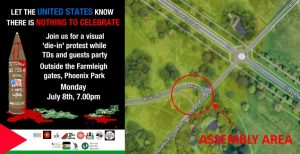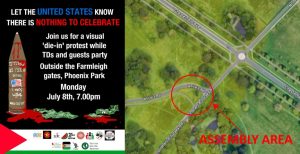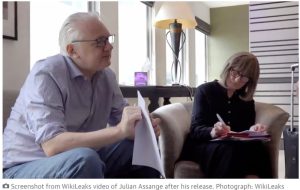by Lola Hynes – Irish Anti War Movement
Despite ongoing negotiations with the International Atomic Energy Agency (IAEA) and full compliance with the Nuclear Non Proliferation Treaty (NPT), Iran’s nuclear programme is still the subject of much media hysteria and deep mistrust from Israel and Western powers. The latest accusations relate to the ‘sanitization’ of a site at Parchin military complex, allegedly to hide evidence of nuclear weapons work. Satellite images showing the destruction of two buildings, the movement of earth and the flow of water coming from an existing building are being used as ‘intelligence’ of the ‘cleansing’ of a bomb containment chamber.
Meanwhile the diplomatic process continues without much promise, in April this year during talks in Istanbul, Iran, the US and the EU agreed to negotiate stricter NPT requirements for Iran in return for respect for their right to the peaceful use of nuclear energy. The next round of talks in the Iraqi capital reached a stalemate when the West offered no relief from sanctions in return for suspension of uranium enrichment at one of Iran’s facilities. Further talks are scheduled in Moscow in late June.
The peaceful nature of Tehran’s nuclear program was reaffirmed by Iran’s envoy to the IAEA; Ali Asghar Solitanieh at a recent meeting of the board of governors of the agency, reminding that the UN nuclear watchdog agency has repeatedly confirmed non-diversion of Iran’s civilian nuclear activities after carrying out a record number of inspections in Iran during the last few years.
by Lola Hynes – Irish Anti War Movement
Despite ongoing negotiations with the International Atomic Energy Agency (IAEA) and full compliance with the Nuclear Non Proliferation Treaty (NPT), Iran’s nuclear programme is still the subject of much media hysteria and deep mistrust from Israel and Western powers. The latest accusations relate to the ‘sanitization’ of a site at Parchin military complex, allegedly to hide evidence of nuclear weapons work. Satellite images showing the destruction of two buildings, the movement of earth and the flow of water coming from an existing building are being used as ‘intelligence’ of the ‘cleansing’ of a bomb containment chamber.
Meanwhile the diplomatic process continues without much promise, in April this year during talks in Istanbul, Iran, the US and the EU agreed to negotiate stricter NPT requirements for Iran in return for respect for their right to the peaceful use of nuclear energy. The next round of talks in the Iraqi capital reached a stalemate when the West offered no relief from sanctions in return for suspension of uranium enrichment at one of Iran’s facilities. Further talks are scheduled in Moscow in late June.
The peaceful nature of Tehran’s nuclear program was reaffirmed by Iran’s envoy to the IAEA; Ali Asghar Solitanieh at a recent meeting of the board of governors of the agency, reminding that the UN nuclear watchdog agency has repeatedly confirmed non-diversion of Iran’s civilian nuclear activities after carrying out a record number of inspections in Iran during the last few years.
Speaking in an interview with Asia Times Online, Soltanieh underlined Iran’s continued cooperation with the Agency, and stressed, "Iran has provided one the most robust inspections in IAEA’s history, in light of more than 4,000 man-days of inspections as well as over 100 unannounced inspections in Iran."
"These inspections have confirmed that not even one gram of nuclear material has been diverted to military purposes, and the various reports of the current Director-General and his predecessor confirm this.’’
At the same meeting the Egyptian ambassador read a statement from the members of the NAM (Non Aligned Movement, which consists of more than 100 countries), in support of Iran and Iran’s right to develop nuclear energy for peaceful purposes.
The movement also called for the dispute over Iran’s nuclear issue to be resolved through diplomatic channels. It also stated that any kind of attack or threat of attack against peaceful nuclear facilities is in violation of international law and the agency’s regulations and is condemned.
Iran’s compliance with the NPT requirements was also confirmed by former UK representative to the IAEA, Peter Jenkins in an interview given earlier this year. During which he also cast doubt on the legality of the UN Security Council sanctions against Iran. Under article 39 it must be determined whether an issue represents a threat to peace, ‘none of the resolutions on Iran contains a determination that Iran’s nuclear activities represent a threat to the peace’, he went on to say ‘In the absence of a ‘threat to the peace’ determination, it is questionable whether the Security Council was entitled to adopt binding measures’. The binding measures being crippling economic sanctions affecting ordinary Iranian people.
Despite the lack of evidence of any diversion of uranium to a nuclear weapons programme, Israel are still intent on bullying Iran with threats of military strikes unless they suspend all uranium enrichment, which they are carrying out legally under the guidelines of the Nuclear Non Proliferation Treaty.
While negotiations were going on in Baghdad between Iran and the IAEA, Israeli Defence Minister Ehud Barak reiterated Israel’s position that it would not rule out any option, including a military one. He accused Iran of seeking "a little wriggle room" in moving towards allowing international nuclear inspectors further access to sites and documentation. Earlier he warned against mistaking the "illusion of progress" for real advances. ‘’Israel is demanding a complete halt to Iranian uranium enrichment. All enriched uranium must be removed from the country. There must be no window or crack which the Iranians can creep through to advance their military nuclear programme".
Prime Minister Binyamin Netanyahu delivered a similarly uncompromising message to the six countries – the US, Britain, France, Russia, China and Germany – involved in the talks in the Iraqi capital. "Iran wants to destroy Israel and it is developing nuclear weapons to fulfil that goal," Netanyahu told a conference in Jerusalem. "Against this malicious intention, leading world powers need to display determination and not weakness. They should not make any concessions to Iran."
The Israelis are anxiously trying to convince the world that Iran is pursuing nuclear weapons technology and that once it has achieved its goal it will ‘wipe Israel off the map’, thus giving justification to a pre -emptive attack on Iran. According to the Washington Institute for Near East Policy an Israeli attack on Iran would be a ‘preventative strike’ rather than an aggressive attack.
Even if it was the case that Iran was pursuing nuclear weapons technology (despite the most robust inspections in the history of the IAEA finding no evidence), there is no reason to believe it would behave irresponsibly. According to Bruce Reidel of the Centre for Strategic Research at the National Defence University in Washington, ‘when Iran develops nuclear weapons it will not attack Israel, it will behave like a normal nuclear weapons state and seek to avoid conflict’.
In contrast Israel itself possesses an arsenal of anywhere between 100 – 200 nuclear warheads. It did not sign the Nuclear Non Proliferation Treaty and does not allow any inspections by the IAEA. Israel does not want any Arab nations to possess a nuclear weapon and has jealously guarded its domination on nuclear weapons in the Middle East since the 1960’s. It is clearly willing to use force to maintain this monopoly and prevent any nuclear development in neighbouring Arab countries which it demonstrated in air strikes on nuclear facilities in Iraq in 1981 and Syria in 2007.
Israel are pressing the US to back them in their aggression toward Iran, however the Debka news agency reports the Israeli’s diasppointment with Obama’s refusal to side with Israel’s demands in dealing with the supposed threat of a nuclear program. Israel is losing hope of US intervention and is reverting to default mode of ‘only Israelis can ultimately defend themselves’, noted Ronen Bergman of Israel’s Yedioth Ahronoth newspaper.
Despite President Barack Obama’s previous comment that ‘all options are on the table’ when it comes to Iran, he is reluctant to embroil the US in another war, particularly during an election campaign. An Israeli or a less likely US attack on Iran would have dire consequences for the US, it’s military personnel in the Middle East, its economy due to huge spike in oil prices and of course Obama’s own Presidential campaign.
There is however there is another more convenient way for the Obama administration to undermine Iran and gain popularity with the electorate – through military intervention in Syria.
Syria is Iran’s only military ally and without its support Iran would be strategically isolated, unable to exert its influence in the Middle East. Intervention in Syria and the replacement of the current regime with a Western friendly leader would be extremely advantage to the US. Its replacement leaders would be more likely to regard the US as friend rather than a foe. Washington would gain substantial recognition as fighting for the people in the Arab world, not the corrupt regimes.
According to James Rubin, executive editor at Bloomberg news and former diplomat intervention in Syria would be a calculated risk, but still a risk worth taking as it would help Israel and reduce the risk of a far more dangerous war between Israel and Iran.
‘With the Islamic Republic deprived of its gateway to the Arab world, the Israelis’ rationale for an attack on its nuclear facilities would diminish. Furthermore a new Syrian regime might eventually even resume the frozen peace talks regarding the Golan Heights’.
‘In Lebanon, Hezbollah would be cut off from its Iranian sponsor, since Syria would no longer be a transit point for Iranian training, assistance, and missiles’. All these perceived strategic benefits combined with the moral purpose of saving tens of thousands of civilians from murder at the hands of the Assad regime make intervention an attractive option.
Israeli Defence Minister Ehud Barak, recently told CNN’s Christiane Amanpour that the Assad regimes fall "will be a major blow to the radical axis, major blow to Iran…. It’s the only kind of outpost of the Iranian influence in the Arab world … and it will weaken dramatically both Hezbollah in Lebanon and Hamas and Islamic Jihad in Gaza’’
http://rt.com/usa/news/israel-obama-iran-nuclear-131/
http://www.guardian.co.uk/world/2012/may/23/israel-warns-iran-nuclear
http://english.farsnews.com/newstext.php?nn=9103081424
http://www.atimes.com/atimes/Middle_East/NF09Ak01.html
http://www.foreignpolicy.com/articles/2012/06/04/the_real_reason_to_intervene_in_syria?page=0,1
http://www.huffingtonpost.com/mj-rosenberg/obama-can-win-election-by_b_1571258.html
http://www.washingtoninstitute.org/uploads/Documents/pubs/PolicyNote11.pdf
http://www.gatewayhouse.in/publication/gateway-house/features/all-play-moscow
Reidel, Bruce, Iran-U.S.: After the Iranian Bomb, Institute for National Strategic Studies, September
30, 2011






